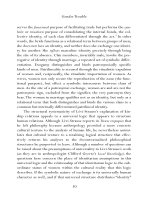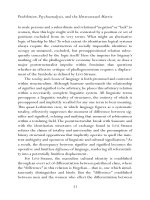GENDER TROUBLE 18
Bạn đang xem bản rút gọn của tài liệu. Xem và tải ngay bản đầy đủ của tài liệu tại đây (26.26 KB, 1 trang )
Preface 1999
a life outside those walls, and though Gender Trouble is an academic
book, it began, for me, with a crossing-over, sitting on Rehoboth
Beach, wondering whether I could link the different sides of my life.
That I can write in an autobiographical mode does not, I think, relocate this subject that I am, but perhaps it gives the reader a sense of
solace that there is someone here (I will suspend for the moment the
problem that this someone is given in language).
It has been one of the most gratifying experiences for me that the
text continues to move outside the academy to this day. At the same
time that the book was taken up by Queer Nation, and some of its
reflections on the theatricality of queer self-presentation resonated
with the tactics of Act Up, it was among the materials that also helped
to prompt members of the American Psychoanalytic Association and
the American Psychological Association to reassess some of their current doxa on homosexuality. The questions of performative gender
were appropriated in different ways in the visual arts, at Whitney exhibitions, and at the Otis School for the Arts in Los Angeles, among others. Some of its formulations on the subject of “women” and the
relation between sexuality and gender also made its way into feminist
jurisprudence and antidiscrimination legal scholarship in the work of
Vicki Schultz, Katherine Franke, and Mary Jo Frug.
In turn, I have been compelled to revise some of my positions in
Gender Trouble by virtue of my own political engagements. In the book, I
tend to conceive of the claim of “universality” in exclusive negative and
exclusionary terms. However, I came to see the term has important
strategic use precisely as a non-substantial and open-ended category as I
worked with an extraordinary group of activists first as a board member and then as board chair of the International Gay and Lesbian Human
Rights Commission (1994–7), an organization that represents sexual
minorities on a broad range of human rights issues. There I came to
understand how the assertion of universality can be proleptic and performative, conjuring a reality that does not yet exist, and holding out
the possibility for a convergence of cultural horizons that have not yet
xvii









